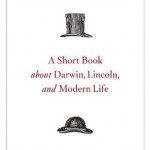 The title comes from the controversy (assuming you knew there was a controversy) over whether Edwin Stanton, upon Lincoln taking his last breath, said “Now he belongs to the ages” or “Now he belongs to the angels.” With this contrivance as a starting point Gopnik presents what amounts to six essays.
The title comes from the controversy (assuming you knew there was a controversy) over whether Edwin Stanton, upon Lincoln taking his last breath, said “Now he belongs to the ages” or “Now he belongs to the angels.” With this contrivance as a starting point Gopnik presents what amounts to six essays.
Gopnik does look at Lincoln and Darwin and their contributions, habits, beliefs, and psyches in ways different than do other writers. Whereas James Landers’ Lincoln and Darwin: Shared Visions of Race, Science and Religion (reviewed recently by me here) gets way into the weeds of comparison, Gopnik takes a more philosophical and less comparable approach. In doing so he reveals some interesting insights into how the two men thought, as well as their use of language (Lincoln the language of the law, Darwin of natural observation).
And yet, the language of the essays themselves tend toward the overtly literary. Often it seems the author is trying to impress the reader with his soliloquy rather than present an impression of the men he is profiling. The first and last chapters in particular seem more about Gopnik than Lincoln and Darwin. That said, the intervening four chapters, hopping between the two men, are worth wading through for the gems that may or may not be obvious to most readers.
I do recommend those interested in Lincoln and Darwin read the book, but for the bigger picture insights into their habits rather than the details that support them. For more comprehensive books comparing these two men born on the same day, check out the James Landers book mentioned above and a book by David R. Contosta called Rebel Giants: The Revolutionary Lives of Abraham Lincoln and Charles Darwin.
David J. Kent is a lifelong Lincolnophile and is currently working on a book about Abraham Lincoln’s interest in science and technology. He is also the author of Tesla: The Wizard of Electricity and an ebook Nikola Tesla: Renewable Energy Ahead of Its Time.










